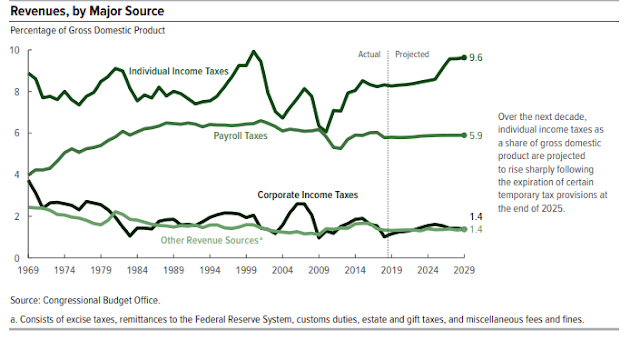Constitutional Provisions
All Bills for raising Revenue shall originate in the House of Representatives; but the Senate may propose or concur with amendments as on other Bills.”
— U.S. Constitution, Article I, section 7, clause 1
To raise and support Armies, but no Appropriation of Money to that Use shall be for a longer Term than two Years;
-- U.S. Constitution, Article I, section 8, clause 12
“No Money shall be drawn from the Treasury, but in Consequence of Appropriations made by Law; and a regular Statement and Account of the Receipts and Expenditures of all public Money shall be published from time to time.”
— U.S. Constitution, Article I, section 9, clause 7
What follows would baffle a Martian.
Authorization
Appropriation

Revenue Bills and RECONCILIATION (Straus ch. 5)
Revenues -- Where the money comes from:
The tax system is more progressive than most people realize: see esp. pages 18, 20, and 23.
Tax expenditures
Outlays -- Where the money goes:

Budget tables: function, subfunction, agency
No, we cannot balance the budget by catching Social Security fraud: only 13 people aged 112 or older are getting checks.
Deficit

What happens if the US government defaults on the federal debt?
“No Money shall be drawn from the Treasury, but in Consequence of Appropriations made by Law; and a regular Statement and Account of the Receipts and Expenditures of all public Money shall be published from time to time.”
— U.S. Constitution, Article I, section 9, clause 7
What follows would baffle a Martian.
Authorization
Appropriation
- Budget Authority
- Outlay
- Continuing resolutions
- The 2020 omnibus -- what is it? Trump "redlined" it but Congress ignored him.

Revenue Bills and RECONCILIATION (Straus ch. 5)
Revenues -- Where the money comes from:
The tax system is more progressive than most people realize: see esp. pages 18, 20, and 23.
Tax expenditures
Outlays -- Where the money goes:

Budget tables: function, subfunction, agency
No, we cannot balance the budget by catching Social Security fraud: only 13 people aged 112 or older are getting checks.
Deficit


No comments:
Post a Comment